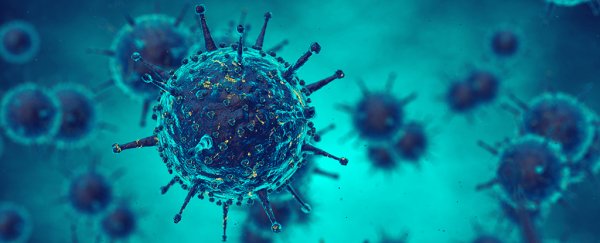The long history of scientific innovation is filled with serendipitous discoveries, and we now have another one to add to the list: a drug that had previously been abandoned due to limited interest has now been shown to fight off two human viruses in laboratory conditions.
The drug in question, known as GSK983, was plucked from obscurity by chemist Chaitan Khosla from Stanford University, who showed it was effective in helping human cells fight off dengue fever and VEEV (Venezuelan equine encephalitis virus), which would normally kill the cells.
Using a screening process to identify the proteins produced by GSK983, Khosla and his team found that GSK983 was able to block the viruses from replicating by preventing the production of RNA (ribonucleic acid).
The only problem? While effective at fighting the viruses, initial tests showed that GSK983 was also blocking the production of DNA in the human cells, so ultimately killed them off at the same time as the virus.
The researchers were able to get around this by adding a slightly different ingredient to the cell mix - one that enables the generation of cellular DNA while maintaining the inhibition of RNA synthesis by GSK983. They report that this could eventually render the drug safe for animals and humans.
The newly discovered powers of GSK983 are part of a broader attempt by the ViRX@Stanford Centre to take a different approach to fighting viruses - one that focusses on boosting the human body's ability to resist, rather than attacking viruses directly.
It was this approach - which the the researchers hope could lead to cures for the common cold and viral outbreaks such as Ebola - that led them to the new drug.
While the team has had limited success so far – only in a lab dish and only on certain viruses - many of the 'nastiest' viruses use RNA rather than DNA as their genetic material, and that means GSK983 could ultimately be very useful.
DNA is where our genetic code is stored, but RNA does the work of putting the DNA blueprint into action, usually as a kind of temporary messenger. While viruses inside the body can be based on either DNA or RNA, RNA viruses usually have higher mutation rates and are more difficult to vaccinate against.
RNA itself is more unstable and has less of an ability to correct errors, and that means viruses based on it are better able to evade detection from the immune system (and vaccines) by constantly changing their form. Ebola and Zika are two well-known viruses to hit the headlines in recent years that are based on RNA.
Working with GSK983, the Stanford team is now figuring out how to develop a drug that stops viruses from importing RNA, as well as developing it naturally. This could be the beginning of a very different approach to combatting some of the world's nastiest - and most contagious - diseases.
The researchers' work has been published in Nature Chemical Biology.
